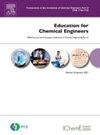Enhancing experimental teaching of β-interferon synthesis through a virtual simulation platform: Application and effectiveness analysis
IF 2.3
2区 教育学
Q1 EDUCATION, SCIENTIFIC DISCIPLINES
引用次数: 0
Abstract
With the continuous advancement of protein-based therapeutics and the expansion of the biopharmaceutical industry, there is an urgent need to enhance undergraduate training in protein synthesis experiments through more accessible, flexible, and engaging experimental approaches. However, traditional educational methods face significant challenges, and emerging virtual simulation technologies have seen limited and fragmented applications in drug synthesis education. In response to these challenges, we designed and implemented a virtual simulation teaching platform for β-interferon synthesis. The platform’s effectiveness was evaluated through standardized assessments and student surveys, comparing its outcomes with those of conventional teaching approaches. Statistical analysis of test scores and survey responses revealed that the virtual simulation platform offers significant advantages over traditional methods, leading to enhanced learning outcomes and higher student satisfaction. These results demonstrate the potential of virtual simulation platform as an innovative and scalable tool for improving experimental education in biopharmaceutical sciences.
利用虚拟仿真平台加强β-干扰素合成实验教学:应用与效果分析
随着基于蛋白质的治疗学的不断发展和生物制药产业的扩张,迫切需要通过更容易获得、更灵活、更有吸引力的实验方法来加强蛋白质合成实验的本科培训。然而,传统的教学方法面临着巨大的挑战,新兴的虚拟模拟技术在药物合成教育中的应用有限且分散。针对这些挑战,我们设计并实现了β-干扰素合成的虚拟仿真教学平台。通过标准化评估和学生调查来评估该平台的有效性,并将其结果与传统教学方法进行比较。对考试成绩和调查结果的统计分析表明,虚拟模拟平台比传统方法具有显著优势,可以提高学习效果和学生满意度。这些结果证明了虚拟仿真平台作为一种创新的、可扩展的工具来改善生物制药科学实验教育的潜力。
本文章由计算机程序翻译,如有差异,请以英文原文为准。
求助全文
约1分钟内获得全文
求助全文
来源期刊

Education for Chemical Engineers
Multiple-
CiteScore
8.80
自引率
17.90%
发文量
30
审稿时长
31 days
期刊介绍:
Education for Chemical Engineers was launched in 2006 with a remit to publisheducation research papers, resource reviews and teaching and learning notes. ECE is targeted at chemical engineering academics and educators, discussing the ongoingchanges and development in chemical engineering education. This international title publishes papers from around the world, creating a global network of chemical engineering academics. Papers demonstrating how educational research results can be applied to chemical engineering education are particularly welcome, as are the accounts of research work that brings new perspectives to established principles, highlighting unsolved problems or indicating direction for future research relevant to chemical engineering education. Core topic areas: -Assessment- Accreditation- Curriculum development and transformation- Design- Diversity- Distance education-- E-learning Entrepreneurship programs- Industry-academic linkages- Benchmarking- Lifelong learning- Multidisciplinary programs- Outreach from kindergarten to high school programs- Student recruitment and retention and transition programs- New technology- Problem-based learning- Social responsibility and professionalism- Teamwork- Web-based learning
 求助内容:
求助内容: 应助结果提醒方式:
应助结果提醒方式:


